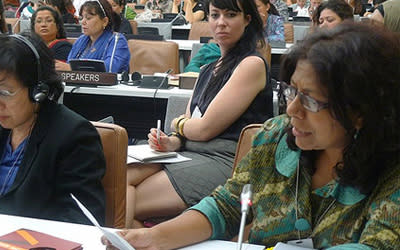‘Employment Act still excludes too many women’

Provide more legal protection and social services for vulnerable women, such as victims of sexual harassment, foreign domestic workers and foreign wives married to Singapore men.
And when tackling women's issues, have the government consult other organisations beyond the three approved bodies on women's issues.
These were some of the recommendations the Association of Women for Action and Research (Aware) presented to the United Nations (UN) on Tuesday to improve women's rights in Singapore.
This is the third time Aware is submitting a shadow report to the UN committee on the Convention On the Elimination Of All Forms of Discrimination Against Women (CEDAW).
Singapore acceded to the UN Convention 16 years ago on 5 October 1995.
Listing vulnerable groups of women, such as pregnant women, foreign domestic workers, casual and contract workers, Aware's Cedaw sub-committee chair Braema Mathi said, "The improved Employment Act still excludes too many women at risk."
Speaking at the UN Cedaw session for non-governmental organisations (Singapore) in New York, she pointed out that foreign women have limited protection under the law; have limited access to under-funded social services; are caught in cross-border issues and run the risk of being classified as immigration offenders.
"It is (a) state obligation to remove these forms of discrimination," she said.
Mathi also pointed to a "stronger civil society" in Singapore and that Prime Minister Lee Hsien Loong, in his post-elections speech, called for greater consultation with grassroots organisations.
"Thus, we find it unacceptable that the government wishes to confine its consultations and dialogues to three approved bodies on women's issues," she said. "(It) ignores the good work and advocacy of many interest groups that work on diverse women's issues."
The three bodies are: the Singapore Council of Women's Organisations, the People's Association Women's Wing and the National Trades Union Congress Women's Committee and Women's Development Secretariat.
In the workplace, Mathi said, "There are still no clearly-defined measures to deal with getting more women to level up in the work force beyond horizontal segregation".
Despite being well-educated, women still hold the lower- to middle-level jobs and earn less than men, she pointed out.
Practices to ensure work-life balance, such as flexible work arrangements, are also not consistently available and there is not enough support to alleviate care-giving responsibilities, she added.
Aware also made the following:
A call on the State to provide a time frame for amending local laws and the Constitution to include 'gender' and 'marital status'.
A call remove the reservation to the State's obligation to ensure that women have equal opportunity and access to employment.
A recommendation that the Office of Women's Development, now under government purview, be made an independent body with its own budget
Minister of State for Community Development, Youth and Sports Halimah Yacob will be leading a delegation to the UN headquarters in New York on 22 July, when she will present Singapore's Fourth Periodic Report at the 49th session of Cedaw.
Madam Halimah will be accompanied by the members of the inter-ministry committee on Cedaw.

